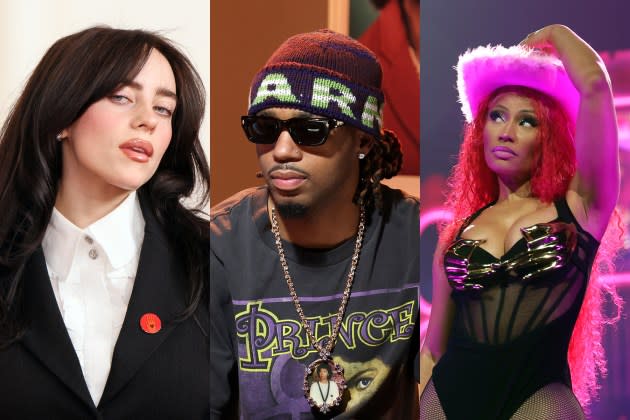Billie Eilish, Metro Boomin, Nicki Minaj Join Hundreds Condemning Unlicensed AI Music

Over 200 artists including Billie Eilish, Nicki Minaj, Metro Boomin, and Pearl Jam have signed an open letter from the Artist Rights Alliance calling on artificial intelligence companies to cease using artists’ music without permission to train their AI tech.
“When used irresponsibly, AI poses enormous threats to our ability to protect our privacy, our identities, our music and our livelihoods,” the letter, whose signatories also included Stevie Wonder, Kacey Musgraves, Katy Perry and Imagine Dragons, said. “Some of the biggest and most powerful companies are, without permission, using our work to train AI models. These efforts are directly aimed at replacing the work of human artists with massive quantities of AI-created ‘sounds’ and ‘images’ that substantially dilute the royalty pools that are paid out to artist. For many working musicians, artists and songwriters who are just trying to make ends meet, this would be catastrophic.”
More from Rolling Stone
SEE the full letter and complete list of artist signees here.
The Artist Rights Alliance, a non-profit group focused on advocacy for music creators, is asking AI companies and other tech platforms “to pledge that they will not develop or deploy AI music-generation technology, content or tools that undermine or replace the human artistry of songwriters and artists or deny us fair compensation for our work.”
The letter takes a markedly similar stance on AI to that of other industry stakeholders like the major record labels. Universal Music Group CEO Lucian Grainge has similarly voiced concerns on both the licensing issues with music and the possibility that AI could further overwhelm the already oversaturated music market with AI content.
Like other industry stakeholders such as UMG and the Human Artistry Campaign spearheaded by the RIAA, The Artist Rights Alliance letter doesn’t completely condemn AI, with the group saying that “when used responsibly, AI has enormous potential to advance human creativity and in a manner that enables the development and growth of new and exciting experiences for music fans everywhere.”
AI remains one of the most pressing issues in the music and entertainment industries as the tech continues to develop at a breakneck pace, with AI music generators growing increasingly impressive. Some come with permission from the music business. Last year, YouTube partnered with UMG and Warner Music Group to launch an experimental AI feature called Dream Track, which turned text prompts into AI songs featuring the cloned vocals of artists like Demi Lovato, Charlie Puth and Charli XCX.
The buzzy AI company Anthropic, which developed the popular chatbot Claude and received billions in investment from Amazon, faces a suit from UMG and several other music publishers over alleged infringement of the publishers’ copyrighted written lyrics.
As AI companies continue to work on their models, lawmakers are considering legislation to protect artists’ works and likenesses. Last month, Tennessee passed the ELVIS Act, an update to the state’s Protection of Personal Rights law, in an effort to protect artists from AI deepfakes and voice clones.
Best of Rolling Stone